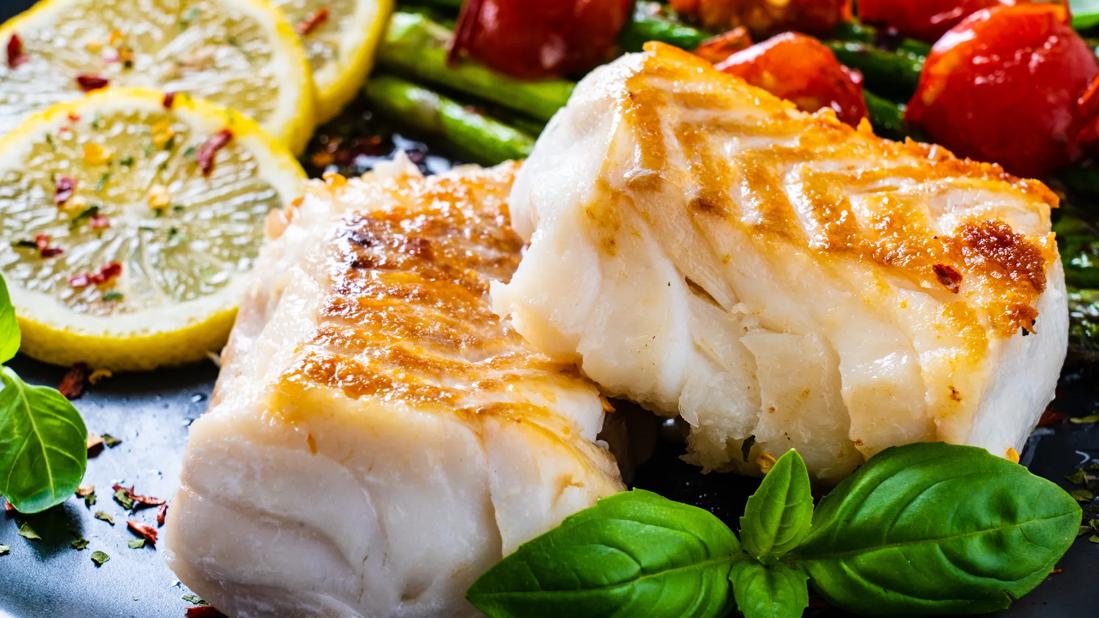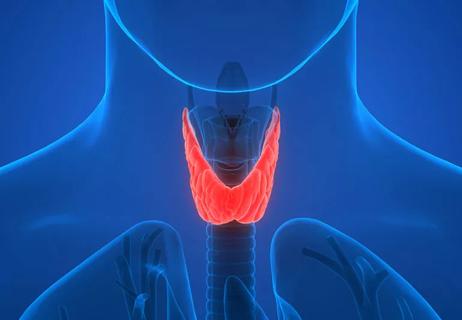Foods high in selenium, like Brazil nuts, cottage cheese and some fish, can help support healthy thyroid function

People with hypothyroidism typically take thyroid (hormone) replacement medications, most commonly, levothyroxine. Hormone replacement therapy increases thyroid hormone in your body, bringing your levels back to normal and helping you to live your healthiest life.
Advertisement
Cleveland Clinic is a non-profit academic medical center. Advertising on our site helps support our mission. We do not endorse non-Cleveland Clinic products or services. Policy
What you eat can affect how your thyroid functions, too, as well as make a difference in how well your thyroid replacement therapy works.
Following a healthy hypothyroidism diet won’t cure hypothyroidism. Most people with hypothyroidism need hormone replacement therapy to help manage their condition.
But your diet can make a difference.
“When you’re taking thyroid hormone replacement therapy, you don’t want anything to affect how your body absorbs the medication,” says endocrinologist Ravali Veeramachaneni, MD. “So, we advise people on these medications to be cautious about certain foods that can make those therapies less effective.”
Dr. Veeramachaneni shares advice for following a healthy diet for hypothyroidism.
Video content: This video is available to watch online.
View video online (https://cdnapisec.kaltura.com/p/2207941/sp/220794100/playManifest/entryId/1_u6iay0ca/flavorId/1_5f3sgelj/format/url/protocol/https/a.mp4)
Got hypothyroidism? Learn how an overall healthy, balanced diet and medications can help keep your thyroid healthy and functioning.
There are a lot of opinions out there about what to eat and what to avoid for hypothyroidism.
And for good reason. There’s no one “best” diet for hypothyroidism. But a healthy diet — like the Mediterranean diet, which emphasizes plenty of fruits and vegetables, lean proteins and whole grains — can make you feel your best and keep you healthy. That's true for just about anyone.
But there are certain precautions people with hypothyroidism should consider before adding certain foods to their plates or taking certain supplements.
Advertisement
Dr. Veeramachaneni explains some of the foods that people with hypothyroidism are commonly told to eat, limit and avoid. And shares why.
People with hypothyroidism should eat a balanced diet to promote their overall health. There are no specific foods that can treat the condition.
That said, some of the best foods for your thyroid health are foods that are rich in selenium, a nutrient that can help encourage healthy thyroid function.
And while some people (with their provider’s OK) will take a selenium supplement, most people can get enough selenium in their diet to help their thyroid work its best.
If you go the way of supplements, stick to no more than 200 micrograms (mcg) per day. Even better, try to incorporate these foods high in selenium as part of your healthy hypothyroidism diet.
| Food | Serving size | Selenium content | Percent daily value |
|---|---|---|---|
| Brazil nuts | 6 to 8 nuts (1 ounce) | 544 mcg | 989% |
| Cooked yellowfin tuna | 3 ounces | 92 mcg | 167% |
| Cooked shrimp | 3 ounces | 42 mcg | 76% |
| Roasted turkey | 3 ounces | 26 mcg | 47% |
| Roasted chicken | 3 ounces | 22 mcg | 40% |
| Cottage cheese (1% milkfat) | 1 cup | 20 mcg | 36% |
| Hard-boiled egg | 1 large egg | 15 mcg | 27% |
| Food | |||
| Brazil nuts | |||
| Serving size | |||
| 6 to 8 nuts (1 ounce) | |||
| Selenium content | |||
| 544 mcg | |||
| Percent daily value | |||
| 989% | |||
| Cooked yellowfin tuna | |||
| Serving size | |||
| 3 ounces | |||
| Selenium content | |||
| 92 mcg | |||
| Percent daily value | |||
| 167% | |||
| Cooked shrimp | |||
| Serving size | |||
| 3 ounces | |||
| Selenium content | |||
| 42 mcg | |||
| Percent daily value | |||
| 76% | |||
| Roasted turkey | |||
| Serving size | |||
| 3 ounces | |||
| Selenium content | |||
| 26 mcg | |||
| Percent daily value | |||
| 47% | |||
| Roasted chicken | |||
| Serving size | |||
| 3 ounces | |||
| Selenium content | |||
| 22 mcg | |||
| Percent daily value | |||
| 40% | |||
| Cottage cheese (1% milkfat) | |||
| Serving size | |||
| 1 cup | |||
| Selenium content | |||
| 20 mcg | |||
| Percent daily value | |||
| 36% | |||
| Hard-boiled egg | |||
| Serving size | |||
| 1 large egg | |||
| Selenium content | |||
| 15 mcg | |||
| Percent daily value | |||
| 27% |
Some foods can interfere with medication for hypothyroidism if you eat too much of them or eat them around the time you take your medication. So, you may be advised to limit these choices.
If you have hypothyroidism, you don’t have to avoid soy altogether. But Dr. Veeramachaneni recommends considering the timing. “Soy can inhibit the absorption of thyroid hormone replacement therapies. So, we suggest avoiding soy a few hours before or after taking those medications.”
In other words, taking your hormone replacements with your soymilk smoothie can hinder medication absorption — keeping your body from getting the benefits of the full dose of medication. So, space them apart.
Soy is a common staple in many people’s diets. Particularly if you follow a vegetarian or vegan diet, soy can be a good source of plant-based protein.
So be cautious about timing when you enjoy soy products:
When cooked, cruciferous vegetables are a healthy addition to your hypothyroidism diet. But going overboard on raw cruciferous vegetables can affect thyroid function.
You don’t need to avoid these veggies altogether. But you do want to be thoughtful about your intake.
“One element that’s important in the production of thyroid hormone is iodine. And eating a lot of raw cruciferous vegetables can reduce your uptake of iodine,” Dr. Veeramachaneni explains. “You want to give your thyroid the ability to use iodine to make as much thyroid hormone as it can, and a diet with high intakes of raw cruciferous vegetables can keep that from happening.”
Advertisement
In other words, it’s true that people with hypothyroidism don’t make enough thyroid hormone. But typically, they still make some. And you want to give your body every chance to make what it can.
To do that, you need sufficient iodine in your system. And overdoing it on raw cruciferous veggies can keep your body from using iodine to the best of its ability.
Cruciferous veggies are some of the hard hitters that we hear about all the time as being good-for-you foods. They’re high in fiber, folate, vitamin C and vitamin K.
Cruciferous vegetables include:
A gluten-free diet isn’t for everyone. It can be a real challenge to cut gluten out of your life. It’s not typically necessary, though, for people with hypothyroidism. And the benefits may not be worth the effort.
But if you notice that you are sensitive to gluten or if you’re living with celiac disease, cutting down or cutting out gluten could be beneficial for your thyroid or your overall health.
“I often see people with hypothyroidism trying out a gluten-free diet and they usually feel good on it,” Dr. Veeramachaneni shares. “The reason being, when you eat less gluten, you may better absorb your thyroid hormone medication and nutrients. And when you have better absorption, it can help you feel your best.”
Advertisement
Talk with a healthcare provider before making big changes to your diet, like going gluten-free. They can advise you on the pros and cons and help ensure you’re still getting the appropriate nutrition.
Some foods and supplements should be avoided altogether when you live with hypothyroidism. Because the risks aren’t worth it.
Some oft-repeated advice regarding a hypothyroidism diet is that you should avoid root vegetables, like carrots, potatoes or beets.
Dr. Veeramachaneni says that’s not the case. “Most root vegetables aren’t known to be a cause for concern for people with hypothyroidism. But there is one exception — cassava.”
Cassava, also known as yuca, is a root vegetable that has origins in South America and Africa. It’s gaining popularity in the United States, particularly in health food markets.
You can buy it whole and cook it yourself, and it’s also sold as:
The trouble is that cassava can be toxic if it’s not prepared properly. That’s true for anyone, including people who don’t have hypothyroidism.
What’s more, the toxins released by cassava (even when it’s properly prepared) can slow down thyroid hormone production. So, it’s not recommended for people with hypothyroidism.
Advertisement
When you hear that iodine is important to spurring production of thyroid hormone, you may think that taking an iodine supplement is an easy answer. Some people turn to kelp supplements as well, as kelp is a naturally high source of iodine.
More iodine, more thyroid hormone, right?
Not so fast. Many supplements can lower the effectiveness of your medications and should be avoided.
“In the U.S. and many other parts of the world, much of our food is already fortified with iodine,” Dr. Veeramachaneni points out. “Chances are you're already getting plenty of iodine. It’s just that your body isn’t using it properly. So, more iodine isn’t going to solve the problem.”
Consider these common foods and their iodine content:
| Food | Serving size | Iodine content | Percent daily value |
|---|---|---|---|
| Baked cod | 3 ounces | 146 mcg | 97% |
| Cooked oysters | 3 ounces | 93 mcg | 62% |
| Plain nonfat Greek yogurt | 3/4 cup | 87 mcg | 58% |
| Nonfat milk | 1 cup | 84 mcg | 56% |
| Iodized table salt | 1/4 teaspoon | 78 mcg | 52% |
| Hard-boiled egg | 1 large egg | 31 mcg | 21% |
| Food | |||
| Baked cod | |||
| Serving size | |||
| 3 ounces | |||
| Iodine content | |||
| 146 mcg | |||
| Percent daily value | |||
| 97% | |||
| Cooked oysters | |||
| Serving size | |||
| 3 ounces | |||
| Iodine content | |||
| 93 mcg | |||
| Percent daily value | |||
| 62% | |||
| Plain nonfat Greek yogurt | |||
| Serving size | |||
| 3/4 cup | |||
| Iodine content | |||
| 87 mcg | |||
| Percent daily value | |||
| 58% | |||
| Nonfat milk | |||
| Serving size | |||
| 1 cup | |||
| Iodine content | |||
| 84 mcg | |||
| Percent daily value | |||
| 56% | |||
| Iodized table salt | |||
| Serving size | |||
| 1/4 teaspoon | |||
| Iodine content | |||
| 78 mcg | |||
| Percent daily value | |||
| 52% | |||
| Hard-boiled egg | |||
| Serving size | |||
| 1 large egg | |||
| Iodine content | |||
| 31 mcg | |||
| Percent daily value | |||
| 21% |
Another common addition to thyroid health supplements is the amino acid L-tyrosine. That should also be avoided.
“L-tyrosine works similar to thyroid hormone medication. So, by taking those supplements when you’re already taking thyroid hormone means you can end up with too much thyroid hormone altogether,” Dr. Veeramachaneni emphasizes.
If you’re concerned about getting proper nutrition while living with hypothyroidism or how your hypothyroidism affects your diet, talk with your healthcare provider. They can advise you on what to eat and avoid to keep healthy and feeling your best.

Sign up for our Health Essentials emails for expert guidance on nutrition, fitness, sleep, skin care and more.
Learn more about our editorial process.
Advertisement

Hypothyroidism is underactivity of your thyroid gland, while hyperthyroidism is overactivity — but both conditions need treatment

No diet can cure hypothyroidism or hyperthyroidism, but some foods and supplements can cause trouble

Only take supplements recommended by your healthcare provider — others can worsen your condition

Typical signs include growth delays and low energy

Hyperthyroidism can make you feel sluggish and exhausted — but so can other conditions

The truth about natural thyroid symptom relief

How overtreatment for hypothyroidism places you at risk

Even small moments of time outdoors can help reduce stress, boost mood and restore a sense of calm

A correct prescription helps your eyes see clearly — but as natural changes occur, you may need stronger or different eyeglasses

Both are medical emergencies, but they are very distinct events with different causes